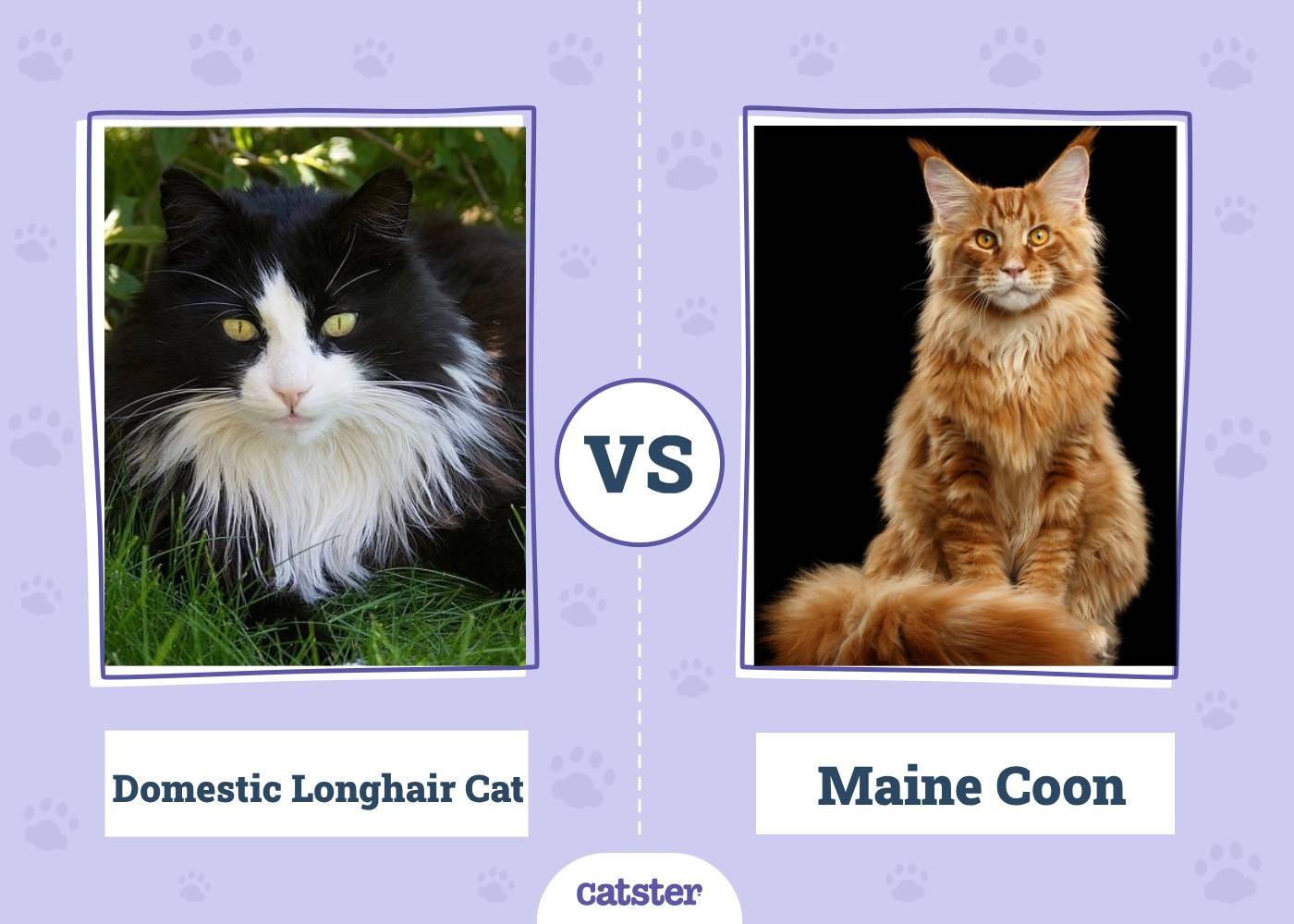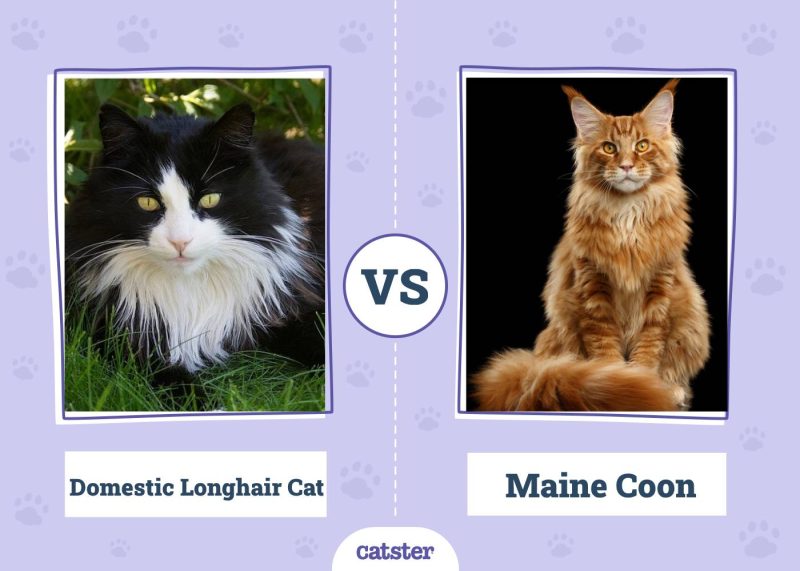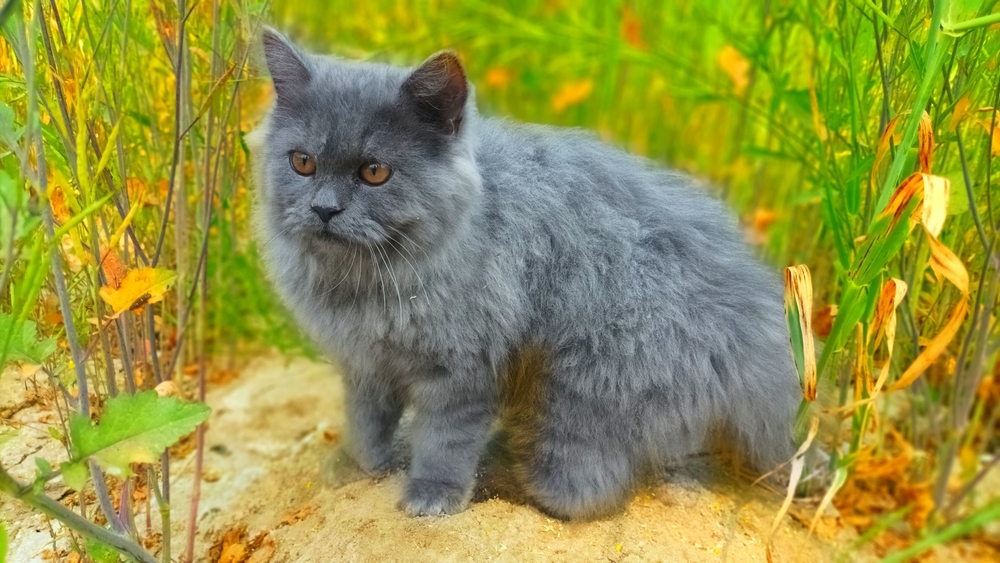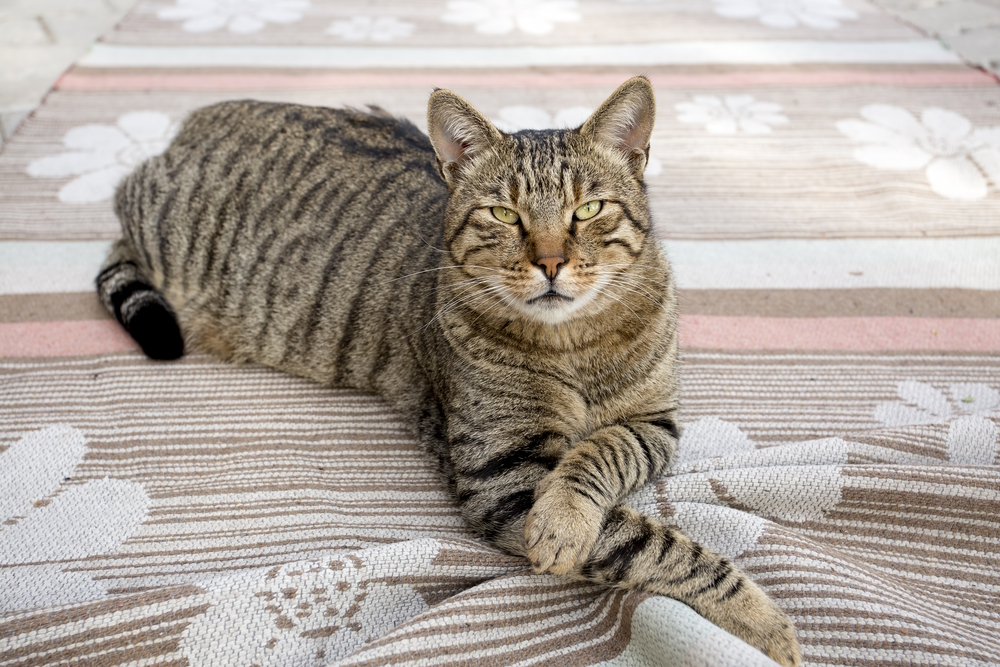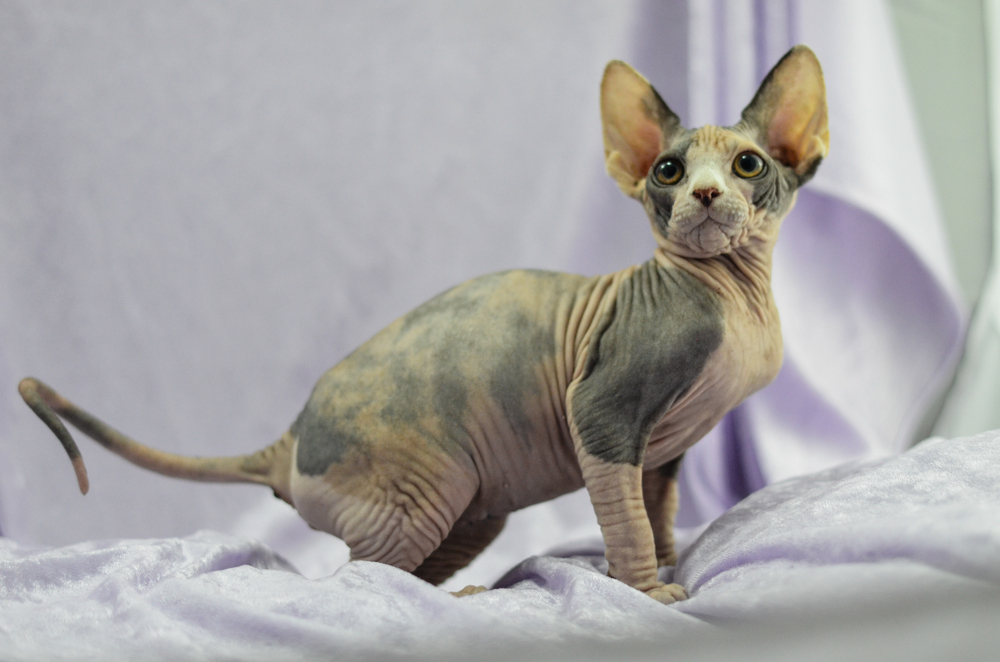Click to Skip Ahead
At first glance, you may think that the Maine Coon and the Domestic Longhair Cats are the same. However, if you place them side-by-side, you’ll immediately notice several physical differences. First, the Maine Coon outweighs the Domestic Longhair by a large margin—which is especially true of males.
Apart from noticeable size differences, there are plenty of ways to tell them apart, even though it is quite possible for a Domestic Longhair to have Maine Coon in its lineage. We’ll pinpoint the traits of each so that you can become a pro at picking out the differences.
Visual Differences
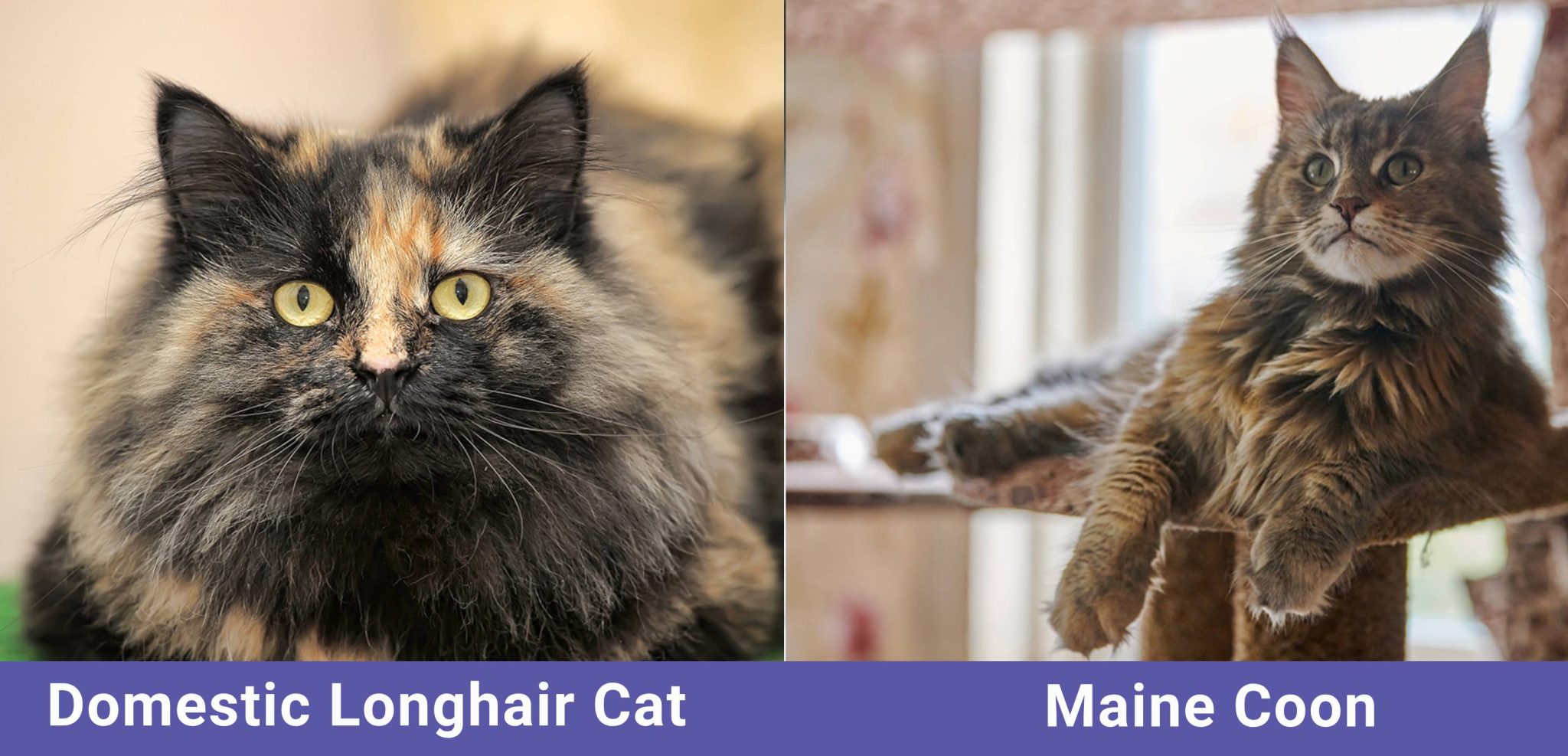
At a Glance
- Average height (adult): 11–12 inches
- Average weight (adult): 8–15 pounds
- Lifespan: 10–17 years
- Exercise: 15–20 minutes a day
- Grooming needs: Moderate
- Family-friendly: Yes
- Other pet-friendly: Yes
- Trainability: Intelligent with a mind of their own
- Average height (adult): 10–16 inches
- Average weight (adult): 10–25 pounds
- Lifespan: 9–15 years
- Exercise: 15–20 minutes per day
- Grooming needs: High
- Family-friendly: Yes
- Other pet-friendly: Yes
- Trainability: Intelligent but stubborn

Domestic Longhair Cat Breed Overview
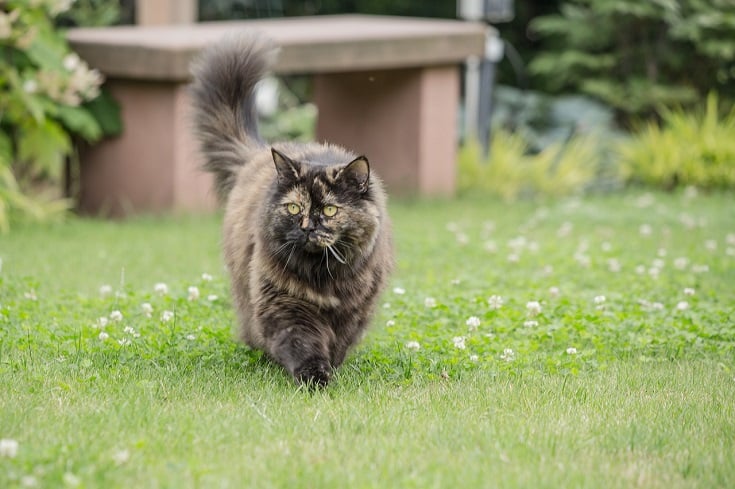
Domestic Longhair cats are a broad category of feline because they aren’t a specified breed. They didn’t originate in any particular place but are a direct result of mixing several cat types. They are simply a classification of long-haired cats without intentional registered breeding.
Physical Attributes
Unlike Maine Coons, Domestic Longhairs are the size of an average house cat, weighing about 10 to 15 pounds as adults. One of these cats can show up in just about any litter if the genetics are right. The term “Domestic Longhair” includes a broad range of domesticated cats, grouping them into a category with mixed ancestry.
Because they are not a specific breed, there are no definite physical traits, only a wide range of possibilities. Domestic Longhairs can be any color or pattern on the spectrum. If you have a long-haired cat that you did not get from a breeder, it probably falls into this category.
Personality & Temperament
Their personalities can differ quite drastically because they’re not explicitly bred for certain temperaments, patterns, or features. You might have a Domestic Longhair that is exceptionally hyperactive and chaotic. Or you could have one that is lazy, relaxed, and even-keeled. It will depend on the genetics of the parents.
Because of the unknown factors of a Domestic Longhair, it’s hard to tell what you’ll get, but that’s part of what makes it exciting. These cats are much more likely to come from unplanned and accidental litters. But don’t let that deter you from owning a Domestic Longhair—some of the best cats are mixed cats.
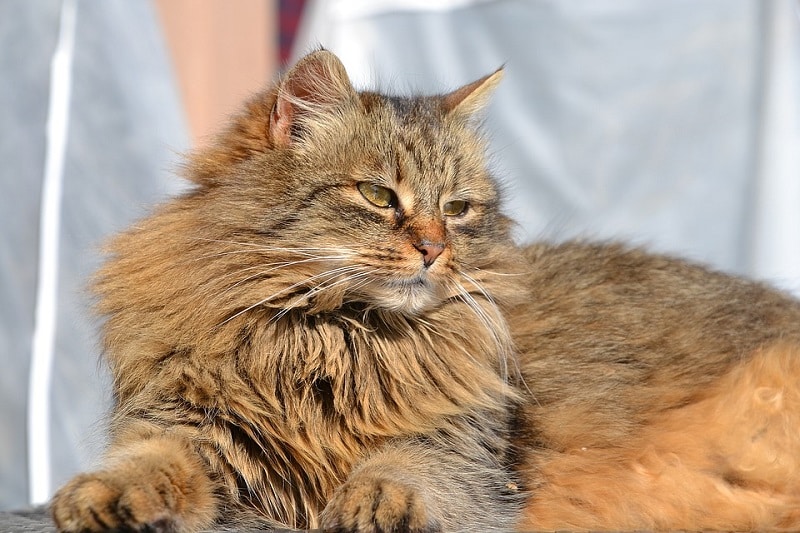
Health & Care
With a Domestic Longhair, their mixed genetics give them advantages and disadvantages. It can be harder to pinpoint predisposed health issues when you don’t know the parent’s health issues. However, they always seem to be much healthier than pure breeds.
Generally, there are problems they might face, as many other cats do. These include:
- Kidney disease
- Arthritis
- Upper respiratory infections
- Cancer
Like any cat, Domestic Longhair cats benefit from high-protein diets and proper hydration. They only need about 15 to 20 minutes of exercise to stay healthy.
Suitable for
Domestic Longhair cats can fit into practically any environment. Because they are not a breed but a combination, they adapt very well. You’re sure to find one that will fit in with your lifestyle. Since they’re not the same across the board, it’s hard to say if they are more suitable for children, seniors, or other owners.
Maine Coon Cat Breed Overview
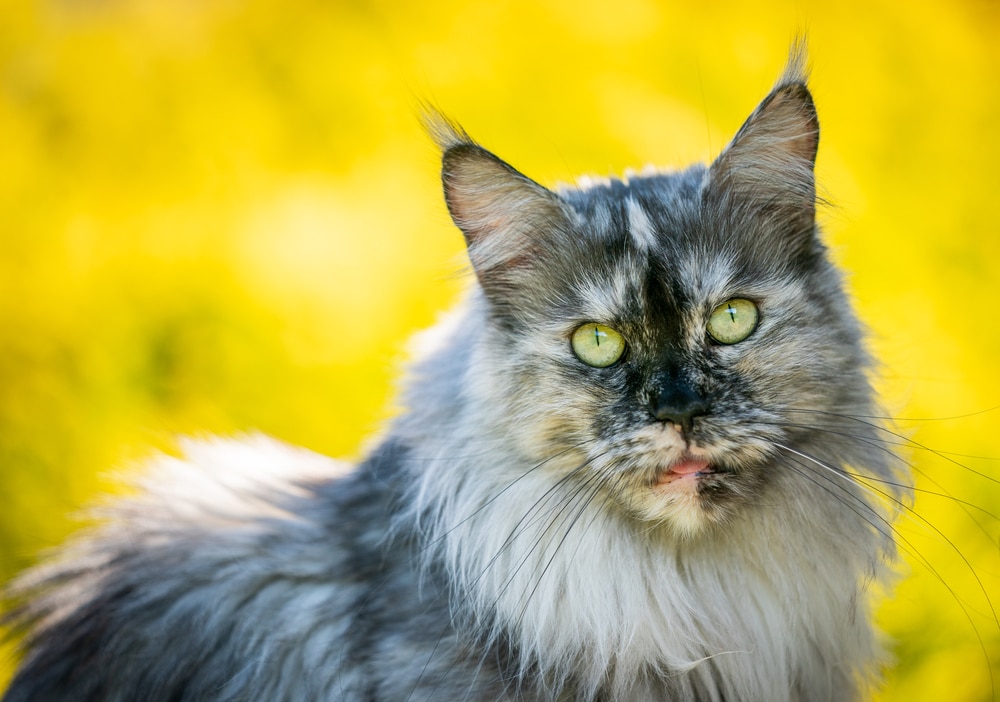
As the name suggests, Maine Coons are native to the state of Maine. Their heavy coats and body structure help them easily withstand the harsh winter elements. The word Coon comes from the North American raccoon, which many of these cats resemble in coat and color.
Physical Attributes
Maine Coons are among the most heavily-boned, majestic, domesticated cats that exist. They can come in several colors, patterns, and sizes. Some of the largest Maine Coons can weigh over 25 pounds. Maine Coons have thick, plush coats that resemble a lion’s mane around their heads.
They look like powerhouses with their intense, serious expressions. Their coats are shaggy, soft, and supple and hang longer in the legs and stomach. Their eyes are large and circular, often with black rings to outline the iris.
Personality & Temperament
Main Coons are relaxed, gentle giants. While they might be fierce hunters, they are incredibly loving companions in the house. However, if you have a mouse problem, they will be the first to snatch them up. You might find that your Maine Coon catches birds, rodents, and other outside creatures.
You might even find one of their prey on the stoop of your door. If you do, try not to punish them for it. It is an offering to you because cats believe that humans cannot hunt for themselves. They’re trying to feed you. Isn’t that sweet?
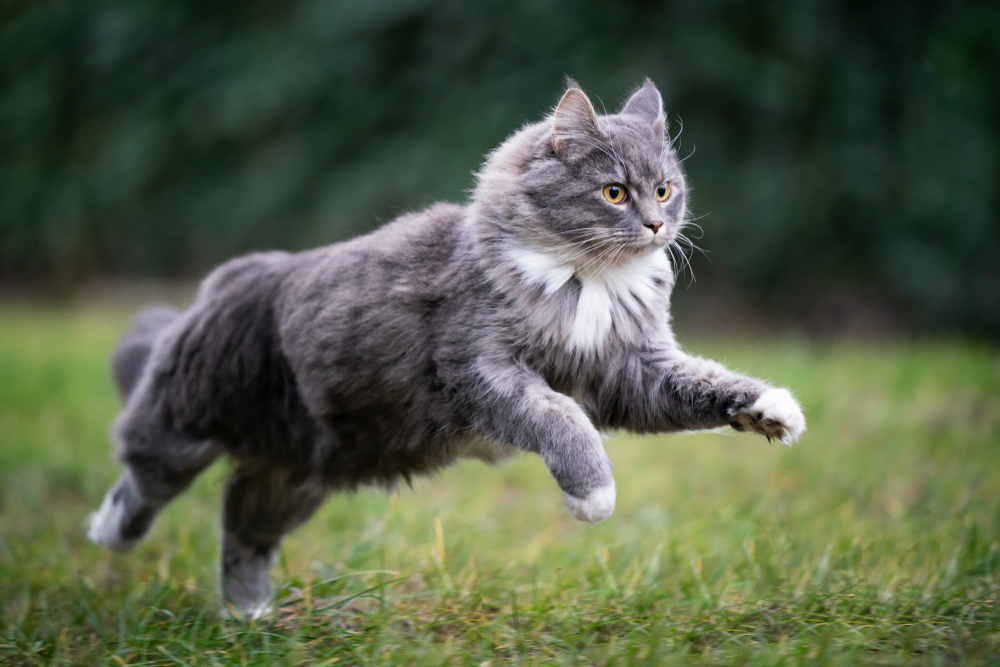
Health & Care
Maine Coons are very resilient cats that can withstand the elements. They don’t encounter too many health issues, especially with proper breeding. However, there are specific ailments you see more often in Maine Coons than in other breeds.
- Hypertrophic cardiomyopathy
- Hip dysplasia
- Spinal muscular atrophy
Because a Maine Coon is a large, heavy-boned cat, protein is even more important for their diet than average cats. Always make sure your Maine Coon is eating a high-protein diet, preferably in combination with wet food to aid in hydration.
Like other cats, they need only about 15 to 20 minutes of daily exercise.
Suitable for
Main Coons are suitable for indoor or outdoor living because of their plush coat and hearty body. They’re also incredible hunters, so they fare very well on their own. They make incredible playmates and buddies for everyone, from babies to adults.
Even though they’re big, they can adapt to smaller environments, but they may be happier in areas where they can roam and wander.
Maine Coon vs. Domestic Longhair Comparison Chart
| Maine Coon | Domestic Longhair |
| Purebred cats costing $400–$2,000 | Not purebreds, no cost cap |
| Solid, smoke, bicolor, tabby | Any pattern |
| 85 color possibilities | Any color possibility |
| Can weigh more than 25 pounds | Generally weighs 10-15 pounds |
| Gentle, non-aggressive personalities | A range of personalities possible |
Can Domestic Longhairs and Maine Coons Be One-in-the-Same?
There is a definite possibility that a Domestic Longhair could be genetically related to a Maine Coon. But that isn’t necessarily always the case. It’s hard to pin down the ancestry of Domestic Longhairs because of all of the unintentional breeding.

Which Breed is Right for You?
Several factors can play a role in deciding which breed to get. Most importantly, you must determine if you want to pay for a purebred cat or just find a cat with long hair. You can find equally fabulous felines regardless of the breed or price.
A Maine Coon’s temperament might be a little more predictable, but not necessarily better or worse. Regardless of your choice, your long-haired beauty will undoubtedly serve as a fabulous companion cat, sharing a lifetime of good memories with you.
See Also:
- Maine Coon vs Turkish Angora: The Differences (With Pictures)
- Maine Coon vs. Ragdoll: The Differences (With Pictures)
Featured Image Credit: Left – brisch27, Pixabay | Right – Seregraff, Shutterstock

